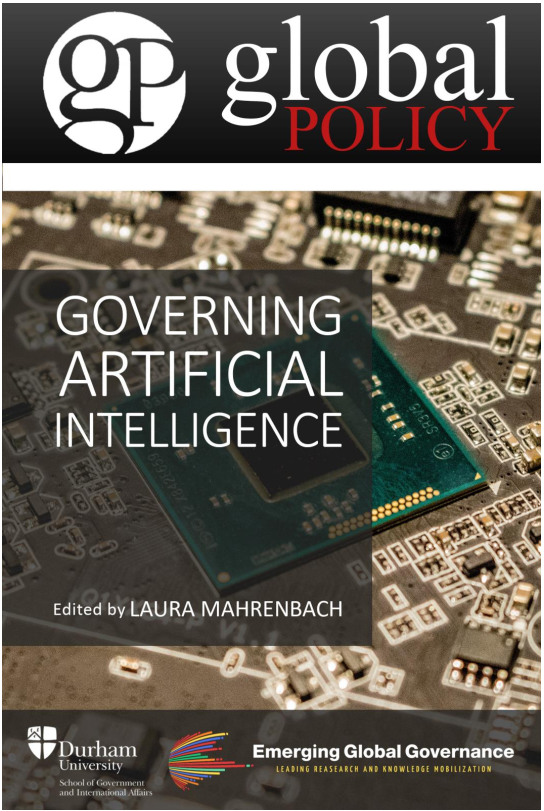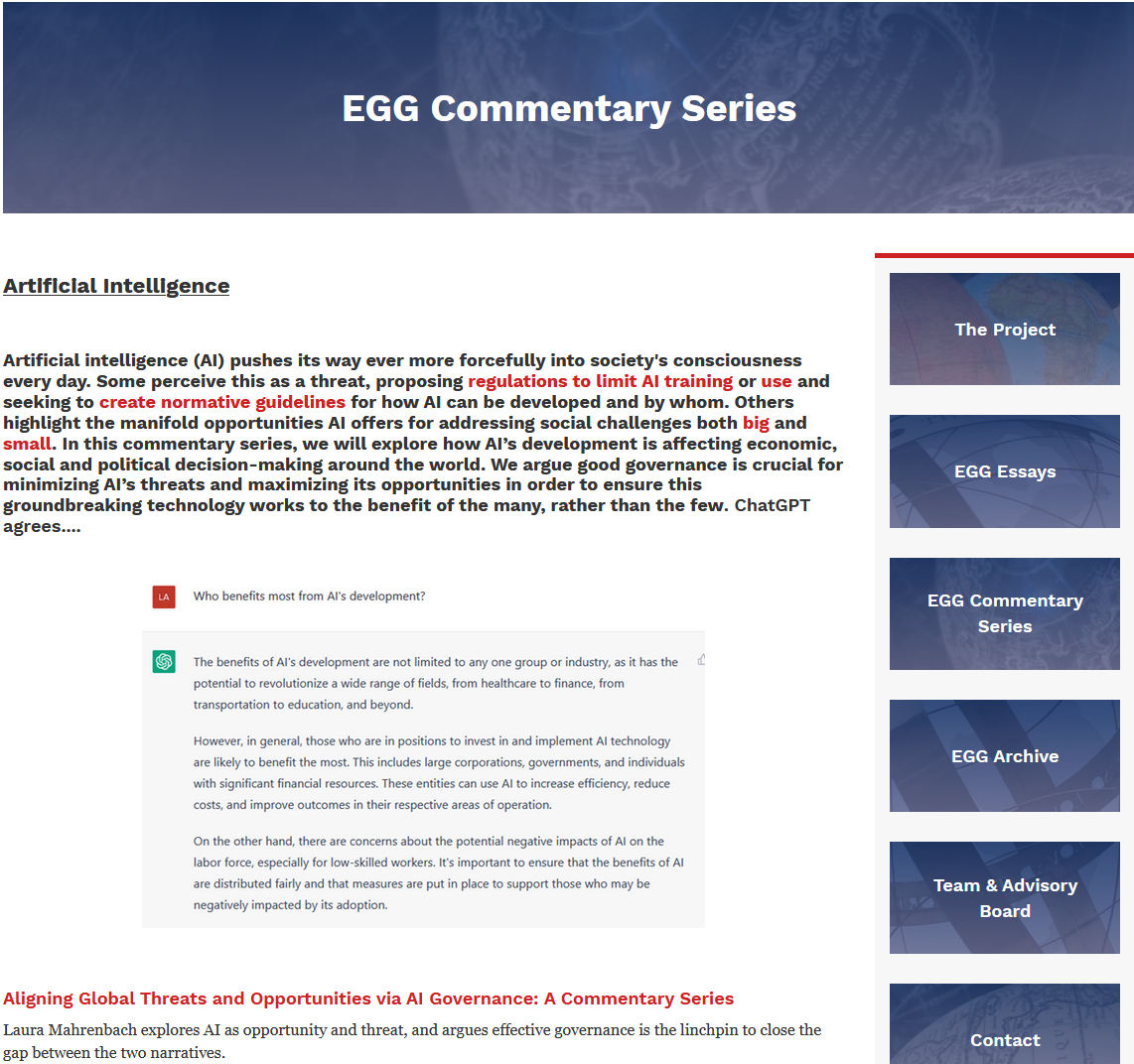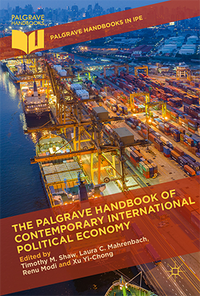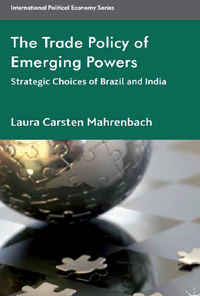Publications
PLEASE NOTE: All publications are peer-reviewed apart from those marked with an *.Edited volumes and special issues

Governing Artificial Intelligence
© 2023. Global Policy Journal at Smashwords.Open access! https://www.globalpolicyjournal.com
Artificial intelligence (AI) pushes its way ever more forcefully into society's consciousness every day. Some perceive this as a threat, proposing regulations to limit AI training or use and seeking to create normative guidelines for how AI can be developed and by whom. Others highlight the manifold opportunities AI offers for addressing social challenges both big and small. In this commentary series, we will explore how AI’s development is affecting economic, social and political decision-making around the world. We argue good governance is crucial for minimizing AI’s threats and maximizing its opportunities in order to ensure this groundbreaking technology works to the benefit of the many, rather than the few.

Aligning Global Threats and Opportunities via AI Governance: A Commentary Series
Commentary series for the Emerging Global Governance project
2023. Global Policyhttps://www.globalpolicyjournal.com
Introductory commentary here - Aligning Global Threats and Opportunities via AI Governance

Beyond the Usual Suspects: Interest Groups in the Global South
Special issue of Interest Groups & Advocacy
2023. (with Patrycja Rozbicka)https://link.springer.com
Understanding interest group systems is crucial to understanding the functioning of advanced democracies, but less is known about its relevance in developing and nascent democracies. While advocacy studies in the Global North have exploded since the late 1990s, exploration of organized interest activities in the Global South remains a niche topic, impeding comparative analysis. In this special issue, we make a case for why investigating lobbying in the Global South can improve theoretical and empirical understandings of advocacy processes and make our work more relevant for contemporary policy questions. Drawing on the findings from the special issue, we present a contemporary research agenda for interest group scholars which identifies where synergies already exist and where South–South and North–South comparative case studies can be built. In so doing, we promote a mutually beneficial dialogue which tables existing research contributions and gaps in each region as opportunities for communal discussion and learning.

The Palgrave Handbook of Contemporary International Political Economy
Palgrave Handbooks in IPE
© 2019. Palgrave Macmillan (with Timothy Shaw, Renu Modi, and Xu Yi-chong).https://www.springerprofessional.de/
Table of contents
Published 35 years after Palgrave Macmillan’s landmark International Political Economy (IPE) series was first founded, this Handbook captures the state of the art of contemporary IPE. It draws on the series’ history of focussing on the oft-neglected study of the global South. Providing interdisciplinary perspectives from scholars hailing from the global North and South, the Handbook illustrates the theoretical innovations and empirical richness necessary to explain today’s ever-changing world. This is a world in which the global South and North are not only being transformed by the end of bipolarity and the rise of the BRICS, but also by diverse global crises and growing cross-border challenges. It is a world where human development, governance and security are becoming ever more elusive, where, profoundly altered by the rise of new technologies, the structure of relations between nations itself is changing, becoming increasingly interconnected, both digitally and physically. Understanding these issues is of critical importance to better understand and comprehend current and future global transformations. This Handbook is the ideal primer for all scholars, practitioners and policy makers looking to do so.
Endorsements
“A truly contemporary Handbook for those interested in the main dynamics of change and continuity in world order, the key emerging challenges and transformative innovations – especially in the decade since the great financial crisis of 2008-09. This very useful teaching and research tool features the latest thinking by respected experts on theories of International Political Economy, and on the sources of disorder, crises, and re-ordering in the global system. The chapters cover the crucial range for IPE from the hot buttons of climate and sustainability, digitalization and artificial intelligence, emerging powers, migration, health, illicit transactions, Brexit, to the bedrock of money, finance, comparative capitalisms, market power, the small and the least, regionalism, gender, energy, resources, law, and global governance. The analyses provide important updates for students of International Political Economy at all levels.”
- Gregory T. Chin, Associate Professor of Political Economy, York University, Canada
“The Handbook brings together scholars from a range of disciplinary and geographical perspectives to consider how to understand the politics of the contemporary global economy. The contributors explore the changing politics – at the international, national and local levels – associated with global economic issues, including the current wave of economic nationalism. The contributors also examine how the rise of various emerging market countries affects global governance. And they wisely draw attention to issues – including migration, climate change, public health and food -- that, despite their importance to global politics, have thus far attracted less attention from international political economy. As such, the Handbook represents a valuable resource for scholars and practitioners alike.”
- Layna Mosley, Professor of Political Science, University of North Carolina at Chapel Hill, USA
“The Handbook of Contemporary IPE brings together an impressive collection of analyses of remarkable depth, making it the ideal reference for everyone seeking to study contemporary International Political Economy from a truly global perspective. It not only provides insight into the major debates in the field, but also points, in a highly accessible way, to new topics that are set to play an increasingly important role in the coming years.”
- Oliver Stuenkel, Associate Professor of International Relations, Getulio Vargas Foundation, Brazil
Monographs

The Trade Policy of Emerging Powers
Strategic Choices of Brazil and India.
© 2013. Palgrave Macmillan.Now available in paperback! - https://www.palgrave.com/gp/book/9781137303707
As emerging powers deepen their involvement in world trade and global governance, it is crucial to explore the what and the why of their strategic choices vis-à-vis the World Trade Organization. This book does just that, examining the trade policy decisions of two emerging power states, Brazil and India, since 2001. In this timely work, Laura Carsten Mahrenbach develops a broad-based analytical framework which addresses trade policy within EP states, in their regions and on the global level. The findings underline the importance of examining domestic factors when trying to understand strategic decisions by emerging powers. They also have important implications for our understanding of the role of emerging power states in global (trade) governance.
Endorsements
“An interesting and sophisticated analysis, this book provides valuable reading for students and scholars working on contemporary trade issues and rising powers.”
- Amrita Narlikar, President, GIGA German Institute of Global and Area Studies
“The foreign economic policy of emerging powers is a highly timely subject. This book presents a much-needed comparative treatment of the role of Brazil and India in trade negotiations. Based on very comprehensive document analysis and many interviews, it contains a wealth of empirical information that will be of great value to policy-makers and scholars. Laura Mahrenbach is to be commended for developing a convincing argument in favour of a domestic politics-approach towards emerging markets international behaviour.”
- Andreas Nölke, Professor of Political Science, Goethe University, Germany
“This book examines the causes for India's and Brazil's international trade strategies in an exemplary, theoretically guided and empirically profound way. In this highly welcome comparative analysis, Laura Carsten Mahrenbach conceptualizes the the potential influence of societal ideas and interests in well developed hypotheses and tests them systematically in detailed case studies. Thus, her book makes an important contribution to the understanding of the role of domestic politics in shaping governmental strategies and to the international political economy of emerging powers.”
- Stefan A. Schirm, Professor of International Relations, Ruhr University, Germany
Peer-reviewed journal articles
Beyond the Usual Suspects: Interest Groups in the Global South
2023. Interest Groups & Advocacy 12: 115–131 (with Patrycja Rozbicka).
>>OPEN ACCESS https://link.springer.com
Measuring Political Legitimacy with Twitter: Insights from India’s Aadhaar Program
2023. New Media & Society 25(10): 2704-2723 (with Jürgen Pfeffer).
>>OPEN ACCESS https://journals.sagepub.com/
Interrogating Technology-Led Experiments in Sustainability Governance
2020. Global Policy 11(4): 523-531 (with Nick Bernards, Malcolm Campbell-Verduyn, Daivi Rodima-Taylor, Andreas Dimmelmeier, Jérôme Duberry, Quinn Dupont, Moritz Hütten, Tony Porter, and Bernhard Reinsberg).
>>OPEN ACCESS https://onlinelibrary.wiley.com
Reforming International Organizations: How Partisanship Shapes State Preferences towards the World Bank
2020. Global Governance Advance article (with Eugénia C. Heldt).
>>OPEN ACCESS https://brill.com
Framing Policy Visions of Big Data in Emerging States
2020. Canadian Journal of Communication 45(1): 129-141 (with Katja Mayer).
https://www.cjc-online.ca
Preprint: http://doi.org/10.5281/zenodo.3688548
How Shared Ideas May Hinder Lobbying Success: British Preference Formation in the G20
2019. Cambridge Review of International Affairs.
https://www.tandfonline.com/
Data: https://dataverse.harvard.edu
Rising Powers in Global Economic Governance: Mapping the Flexibility-Empowerment Nexus
2018. Global Policy 10(1): 19-28 (with Eugénia C. Heldt).
>>OPEN ACCESS https://onlinelibrary.wiley.com
Policy Visions of Big Data: Views from the Global South
2018. Third World Quarterly 39(10): 1861-1882 (with Katja Mayer and Jürgen Pfeffer).
https://www.tandfonline.com/
Data: https://dataverse.harvard.edu
Domestic Politics, Emerging Powers and WTO Dispute Settlement Reform
2016. International Negotiation 21(2): 233-266.
http://booksandjournals.brillonline.com
Deconstructing ‘Emerging Powers’ and ‘Emerging Markets’: India and the United States in Global Governance
2015. India Quarterly 71(4): 348-364.
http://journals.sagepub.com/
Emerging Powers in the IMF and WTO: New Alternatives or Reform?*
2008. ifo Schnelldienst 61(15): 26-29.
https://www.cesifo-group.de/
Privatisierung oder kultureller Darwinismus: Betrachtungen über das amerikanische System der Kulturförderung*
2002. Neues Museum die österreichische Museumszeitschrift 3+4: 32-35 (with Kevin V. Mulcahy).
Book chapters
Aligning Global Threats and Opportunities via AI Governance
2023. In Laura Mahrenbach, ed. Governing Artificial Intelligence. Global Policy Journal at Smashwords.
>>OPEN ACCESS https://www.globalpolicyjournal.com
AI Governance in Practice: A View from the Non-Profit Sector
2023. In Laura Mahrenbach, ed. Governing Artificial Intelligence. Global Policy Journal at Smashwords.
>>OPEN ACCESS https://www.globalpolicyjournal.com
AI Regulation in Practice: A View from the Private Sector
2023. In Laura Mahrenbach, ed. Governing Artificial Intelligence.Global Policy Journal at Smashwords.
>>OPEN ACCESS https://www.globalpolicyjournal.com
Continuities and Change in IPE at the Start of the Twenty-first Century
2019. In Timothy Shaw, Laura Mahrenbach, Renu Modi, and Xu Yi-chong, eds. The Palgrave Handbook of Contemporary International Political Economy. Palgrave Macmillan (with Timothy Shaw).
https://www.springerprofessional.de
Conceptualising Emerging Powers
2019. In Timothy Shaw, Laura Mahrenbach, Renu Modi, and Xu Yi-chong, eds. The Palgrave Handbook of Contemporary International Political Economy. Palgrave Macmillan.
https://www.springerprofessional.de
The Domestic Foundations of Emerging and Established State Trade Cooperation
2019. Li Xing, ed. The International Political Economy of the BRICS. Routledge.
https://www.crcpress.com
Antriebskräfte ökonomischer Globalisierung
2011. In Andreas Niederberger and Philipp Schink, eds. Handbuch Globalisierung. J.B. Metzler Verlag (with Gitta Lauster).
https://www.springer.com/de/book/9783476022721
Web-based publications
Whose AI Is It Anyway? Moving Global Debates from “Mine” to “Ours”
2024.Raisina Edit 2024.Observer Research Foundation.
>>OPEN ACCESS < https://www.orfonline.org/research/
BRICS Wants to Shape Global AI Governance, Too
2024. World Politics Review.
>>OPEN ACCESS < https://www.worldpoliticsreview.com
AI Governance in Practice: A View from the Non-Profit Sector
2023. EGG project commentary series. Global Policy.
>>OPEN ACCESS < https://www.globalpolicyjournal.com
AI Regulation in Practice: A View from the Private Sector
2023. EGG project commentary series. Global Policy.
>>OPEN ACCESS < https://www.globalpolicyjournal.com
Aligning Global Threats and Opportunities via AI Governance
2023. EGG project commentary series. Global Policy.
>>OPEN ACCESS < https://www.globalpolicyjournal.com
Technology-led Governance in and Beyond the Pandemic*
2020. GP Opinion. Global Policy (with
Malcolm Campbell-Verduyn, Nick Bernards, Daivi Rodima-Taylor, Andreas Dimmelmeier,
Jérôme Duberry, Quinn Dupont, Moritz Hütten, Tony Porter, and Bernhard Reinsberg).
>>OPEN ACCESS https://www.globalpolicyjournal.com
Challenges and Opportunities of Studying Big Data in the Global South
2018. Datactive. University of Amsterdam.
>>OPEN ACCESS https://data-activism.net/
The Promises and Challenges of Digitalization and Development in Major Emerging Markets
2018. Emerging Global Governance Essay. Collaboration of the Foreign Policy Institute (Johns Hopkins University/School of Advanced International Studies) with Global Policy.
>>OPEN ACCESS https://www.globalpolicyjournal.com/
Book reviews
Alan S. Alexandroff (ed). Can the World Be Governed? Possibilities for Effective Multilateralism
2011. In Millennium Journal of International Studies 39(3): 905-907.
http://journals.sagepub.com
Working papers
Detaching ‘Emerging’ from ‘Power’: Brazil and India at the WTO Ministerial in 2008*
Otto-Friedrich-University Bamberg, Working Paper BOPIR 1/2010, Bamberg.
www.uni-bamberg.de
India, Asia and the World Trade Organization: Are Regional Initiatives Moving into Global Governance’s Territory?*
Otto-Friedrich-University Bamberg, Working Paper BOPIR 9/2009, Bamberg.
Work in progress or under review
Digital Polarity Theory: Digital Fragmentation and the Global Economy (with Maximilian Mayer)
Constructive Disruption: The BRICS and Global Governance